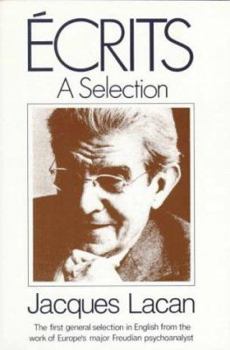Ecrits: A Selection
Select Format
Select Condition 
Book Overview
Brilliant and innovative, Jacques Lacan's work lies at the epicenter of modern thought about otherness, subjectivity, sexual difference, the drives, the law, and enjoyment. This new translation of his complete works offers welcome, readable access to Lacan's seminal thinking on diverse subjects touched upon over the course of his inimitable intellectual career.
Format:Paperback
Language:English
ISBN:0393300471
ISBN13:9780393300475
Release Date:January 1982
Publisher:W. W. Norton & Company
Length:338 Pages
Weight:0.90 lbs.
Dimensions:0.9" x 5.6" x 8.3"
Customer Reviews
4 ratings
a major achievement
Published by Thriftbooks.com User , 19 years ago
Bruce Fink's translation of Ecrits is sure to supplant Sheridan's translation as the most eminently readable and comprehesive rendering of Lacan in English. Having worked with both translations as well as the original French, I can say with confidence that the 2002 translation is superior in almost every respect, and I anxiously await the full translation of the Ecrits (an incredible accomplishment, to be sure) later this year.
An Essential Translation
Published by Thriftbooks.com User , 22 years ago
The experience of reading Lacan can be difficult for some, if not most of us; his work requires us to be active in our comprehension and imagination. For many years there has only been one translation of this important work, which has hampered Lacan's introduction to the Anglophone world. We now have a new translation and splendid it is! It does not give instant access to Lacan and the book still needs "active" reading, but it certainly helps. This modern translation - worked on by three people close to the work of Lacan - is fully annotated and referenced to give the reader a complete entry into the work as composed at the time (a hermeneutics of Lacan, perhaps?). We have many books about the work of this important psychoanalyst and thinker - but eventually the desire comes to read his original work and this translation certainly allows, supports and encourages this. This translation of the Ecrits will prove valuable for many years to come. Congatulations need to go to Fink, Fink and Grigg for their excellent work.
For the function of language is not to inform, but to evoke
Published by Thriftbooks.com User , 23 years ago
If you merely dip into Lacan's masterwork, I cannot recommend too highly parts two and three of Function and field. Here's a sample on the ontological roots of the symbolic: Man's freedom is entirely inscribed within the constituting triangle of the renunciation that he imposes on the desire of the other by the menace of death for the enjoyment of the fruits of his serfdom - of the consented-to sacrifice of his life for the reasons that give to human life its measure - and of the suicidal renunciation of the vanquished partner, depriving of his victory the master whom he abandons to his inhuman solitude. Of these figures of death, the third is the supreme detour through which the immediate particularity of desire, reconquering its ineffable form, rediscovers in negation a final triumph. And we must recognize its meaning, for we have to deal with it. This third figure is not in fact a perversion of the instinct, but rather that desperate affirmation of life that is the purest form in which we recognize the death instinct. The subject says 'No!' to this intersubjective game of hunt-the-slipper in which desire makes itself recognized for a moment, only to become lost in a will that is the will of the other. Patiently, the subject withdraws his precarious life from the sheeplike conglomerations of the Eros of the symbol in order to affirm it at the last in an unspoken curse. So when we wish to attain in the subject what was before the serial articulations of speech, and what is primordial to the birth of symbols, we find it in death, from which his existence takes on all the meaning it has.... To say that this mortal meaning reveals in speech a centre exterior to language is more than a metaphor; it manifests a structure.
Not for the faint of heart
Published by Thriftbooks.com User , 25 years ago
There are books about Jacques Lacan, and there are books that record his lectures in an informal way, but this is the only one that I know of that presents his words, as he meant them. Lacan is the guy who took Freud and De Saussure and integrated the two, and his insights are brilliant and very difficult to follow. This book is an odd combination of Lacan's histrionic attacks on his opponents, of tedious punnings and lengthy and awkward sentences, and wonderful insights. I keep picking it up and plugging away at it, in the belief that his interpretors and translators don't do him justice, and in the belief that he's the smartest guy around, in the humanities. He argues persuasively for example that the ego, which we think in the Anglo-American tradition is the major organ of our personhood, is little more than a clever creation of, and creator of words -- without integrity or grounding. De Saussure, the creator of Structuralism, left behind only one (albeit lucid) book, and I urge any "advanced hobbyists" of the intellect to tackle that prior to tackling Lacan, who read De Saussure closely and if nothing else develops our insight into what it means that language has its own patterns of distortion, its own "agenda" if you will, and that we struggle as persons to distinguish ourselves as persons from ourselves as creations of the system of meaning and language.






